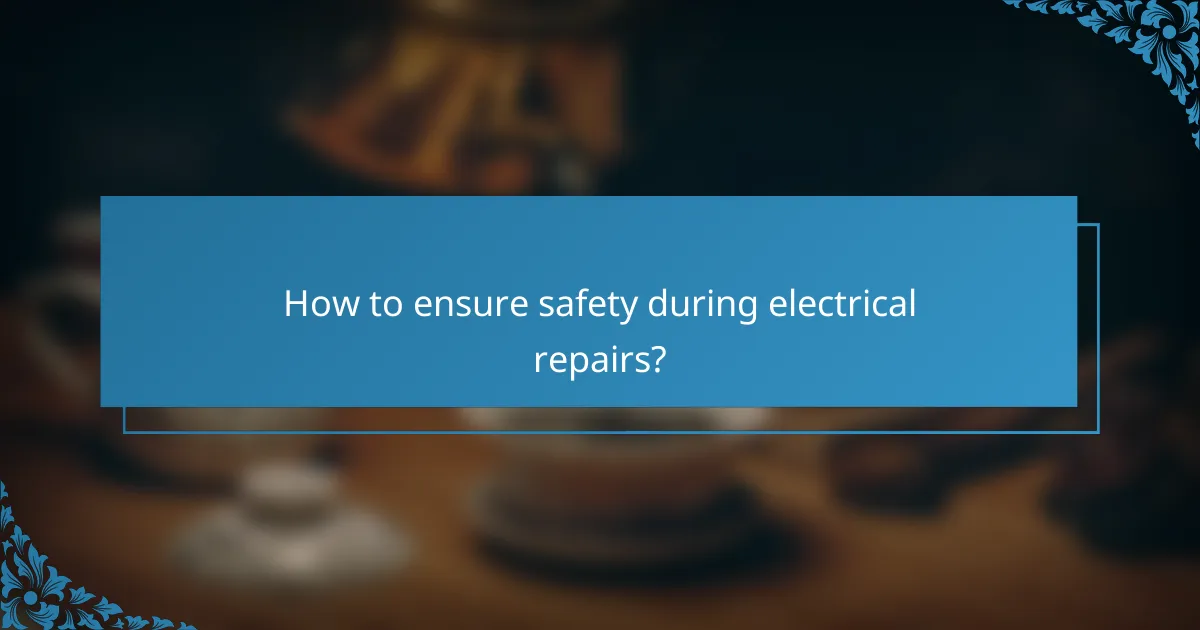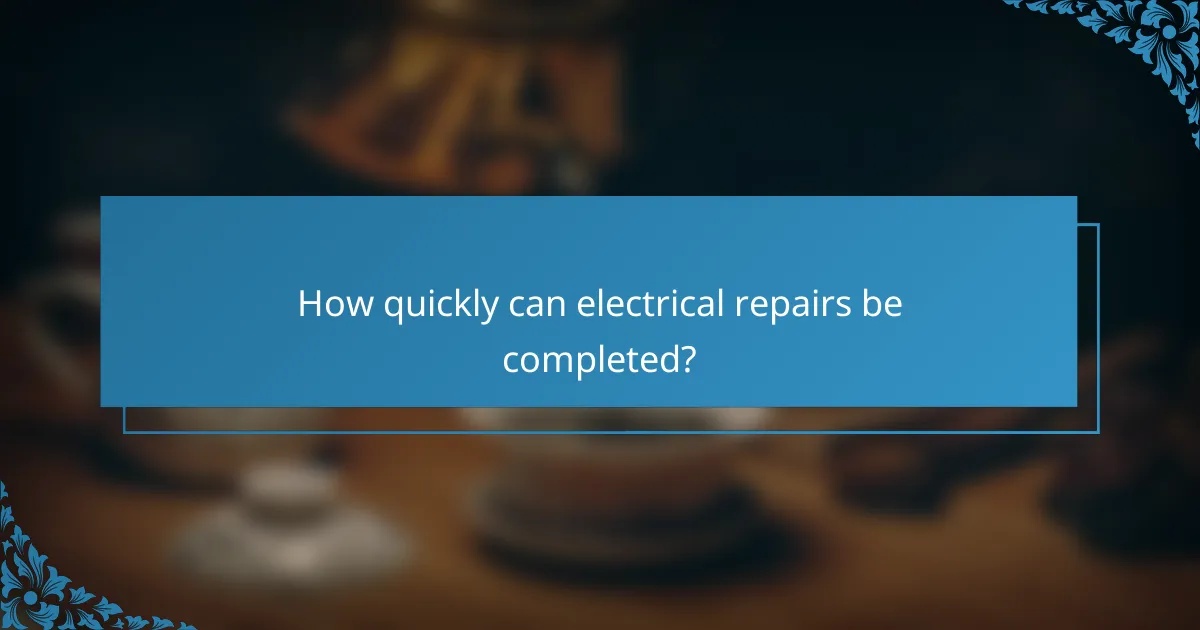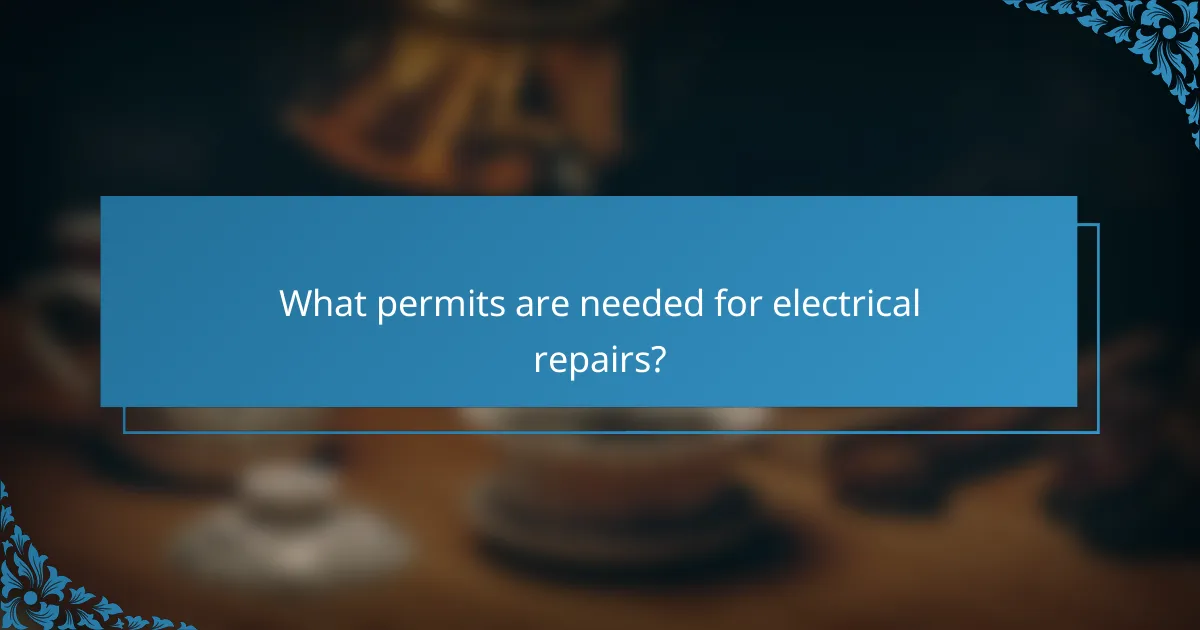Electrical repairs are essential for maintaining safety and functionality in both residential and commercial properties. By utilizing professional standards and adhering to local regulations, qualified electricians provide quick and reliable services, ensuring that all repairs are performed safely and effectively. Prioritizing safety through the use of proper tools and protective gear further minimizes the risk of accidents during electrical work.

What are the common electrical repair solutions in Australia?
In Australia, common electrical repair solutions include wiring repairs, circuit breaker replacements, lighting fixture installations, outlet repairs, and fuse box upgrades. These services ensure safety, compliance with local regulations, and improved functionality in residential and commercial properties.
Wiring repairs
Wiring repairs address issues like frayed wires, loose connections, or outdated systems that can pose safety hazards. It’s crucial to identify the type of wiring used, as older materials may not meet current safety standards.
When considering wiring repairs, hire a licensed electrician to assess the situation. They will ensure that any repairs comply with the Australian Wiring Rules (AS/NZS 3000) and provide a safe solution.
Circuit breaker replacements
Circuit breaker replacements are necessary when breakers frequently trip or show signs of wear. This service enhances electrical safety by preventing overloads and potential fire hazards.
Choosing the right circuit breaker involves understanding the electrical load of your home. A qualified electrician can help determine the appropriate amperage and type, ensuring compliance with Australian standards.
Lighting fixture installations
Lighting fixture installations improve both aesthetics and functionality in a space. Whether upgrading to energy-efficient LED fixtures or adding new lighting, professional installation ensures safety and compliance with regulations.
Consider the layout and purpose of the room when selecting fixtures. A licensed electrician can assist in choosing the right type and ensuring proper installation to avoid electrical hazards.
Outlet repairs
Outlet repairs are essential for maintaining safe and functional electrical systems. Common issues include loose outlets, faulty wiring, or damaged sockets that can lead to electrical shocks or fires.
Regularly inspect outlets for signs of wear or damage. If you notice any issues, contact a licensed electrician to assess and repair the problem, ensuring compliance with local safety standards.
Fuse box upgrades
Fuse box upgrades are often necessary for older homes that still use fuses instead of modern circuit breakers. Upgrading enhances safety and allows for increased electrical capacity to support modern appliances.
When upgrading, ensure the new fuse box meets Australian standards and is installed by a qualified electrician. This will help prevent electrical issues and ensure your home can handle current energy demands.

How to ensure safety during electrical repairs?
Ensuring safety during electrical repairs involves using the right tools, following established standards, and wearing appropriate protective gear. By adhering to these practices, you can significantly reduce the risk of accidents and injuries.
Use of insulated tools
Using insulated tools is crucial for preventing electrical shocks while performing repairs. These tools are designed with non-conductive materials that protect you from live wires and circuits. Always check the insulation rating of your tools to ensure they meet safety standards, typically rated for voltages ranging from 1,000 to 1,500 volts.
When selecting insulated tools, look for those that are certified by recognized organizations. Regularly inspect your tools for any signs of wear or damage, as compromised insulation can lead to dangerous situations.
Adherence to Australian standards
Adhering to Australian standards, such as AS/NZS 3000, is essential for safe electrical work. These standards provide guidelines on wiring, installation, and maintenance practices to ensure safety and reliability. Familiarize yourself with these regulations to avoid non-compliance, which can lead to legal issues and safety hazards.
Consider consulting with a licensed electrician who is well-versed in Australian standards if you are unsure about specific requirements. This can help ensure that your repairs are performed safely and in accordance with the law.
Personal protective equipment (PPE)
Wearing personal protective equipment (PPE) is vital for safeguarding yourself during electrical repairs. Essential PPE includes safety goggles, gloves rated for electrical work, and non-slip footwear. These items help protect against electrical shocks, falling objects, and other hazards.
Always ensure that your PPE is in good condition and appropriate for the specific tasks you are performing. Regularly review your safety gear and replace any worn or damaged items to maintain a high level of protection while working on electrical systems.

What professional standards should electricians meet?
Electricians must adhere to specific professional standards to ensure safety and quality in their work. These standards include obtaining proper licensing, maintaining insurance coverage, and complying with relevant electrical codes and regulations.
Licensing requirements in Australia
In Australia, electricians are required to hold a valid license issued by the relevant state or territory authority. This ensures they have completed the necessary training and assessments to perform electrical work safely and competently.
Licensing requirements may vary slightly between states, but generally, electricians must complete an apprenticeship and pass a licensing exam. Always verify that your electrician holds a current license to avoid potential legal and safety issues.
Insurance coverage
Insurance coverage is essential for electricians to protect themselves and their clients from potential liabilities. Most electricians should carry public liability insurance, which covers damages or injuries that may occur during their work.
Additionally, having professional indemnity insurance can safeguard against claims of negligence or faulty workmanship. It’s advisable to ask your electrician for proof of insurance before hiring them to ensure adequate coverage is in place.
Compliance with AS/NZS 3000
Compliance with the AS/NZS 3000 standard, also known as the Australian/New Zealand Wiring Rules, is crucial for electricians. This standard outlines the minimum safety requirements for electrical installations, ensuring they are safe and reliable.
Electricians must follow these guidelines during installation, maintenance, and repair work. Non-compliance can lead to serious safety hazards and legal repercussions, so always confirm that your electrician adheres to these standards for your peace of mind.

How quickly can electrical repairs be completed?
Electrical repairs can often be completed within a few hours, depending on the complexity of the issue. Factors such as the type of repair needed and the availability of parts can influence the overall time frame.
Same-day service availability
Many electrical service providers offer same-day service for urgent repairs. This means that if you report an issue in the morning, a qualified electrician may arrive at your home or business within hours to address the problem.
To ensure same-day service, it’s advisable to contact a local electrician early in the day and clearly communicate the urgency of your situation. Some companies may charge a premium for this expedited service, so inquire about any additional fees.
Response time for emergency repairs
Emergency repairs typically have a rapid response time, often within 1 to 2 hours. Electricians prioritize emergencies such as power outages, exposed wiring, or electrical fires to ensure safety and restore functionality.
When calling for emergency services, provide detailed information about the issue and its potential hazards. This helps the technician prepare and arrive with the necessary tools and parts.
Typical repair duration for common issues
The duration of electrical repairs varies based on the specific problem. For instance, replacing a light fixture may take around 30 minutes, while fixing a circuit breaker could take 1 to 2 hours.
More complex issues, such as rewiring or panel upgrades, can take several hours or even a full day. Always ask your electrician for an estimated time frame before the work begins to set realistic expectations.

What permits are needed for electrical repairs?
For electrical repairs, obtaining the necessary permits is crucial to ensure compliance with local laws and safety standards. Typically, permits are required for significant electrical work, including installations, modifications, or repairs that affect the electrical system’s integrity.
Local council permits
Local council permits are often mandatory for electrical repairs, especially when they involve structural changes or new installations. The specific requirements can vary by municipality, so it’s essential to check with your local council to understand what permits are needed for your project.
Generally, the process involves submitting an application detailing the scope of work, which may include plans or diagrams. Fees for these permits can range from modest amounts to several hundred dollars, depending on the complexity of the work and local regulations.
Compliance with electrical safety regulations
Compliance with electrical safety regulations is critical for ensuring that repairs are performed safely and effectively. These regulations often align with national standards, which dictate how electrical systems should be installed and maintained to prevent hazards.
When undertaking electrical repairs, it’s important to ensure that all work meets the National Electrical Code (NEC) or equivalent standards in your country. This may involve using certified materials, following specific installation practices, and ensuring that all work is inspected by a qualified professional.

How to choose a reliable electrician in Australia?
To choose a reliable electrician in Australia, prioritize licensed professionals with a solid reputation. Look for those who adhere to local regulations and offer transparent pricing and quality service.
Checking reviews and testimonials
Reviews and testimonials are crucial for assessing an electrician’s reliability. Start by checking online platforms like Google, Yelp, or local directories to see what previous customers say about their experiences.
Look for electricians with consistently high ratings and positive feedback. Pay attention to comments regarding punctuality, quality of work, and customer service, as these factors can indicate a professional’s reliability.
Consider asking for references directly from the electrician. Speaking to past clients can provide valuable insights into their work ethic and the overall satisfaction of their services.
